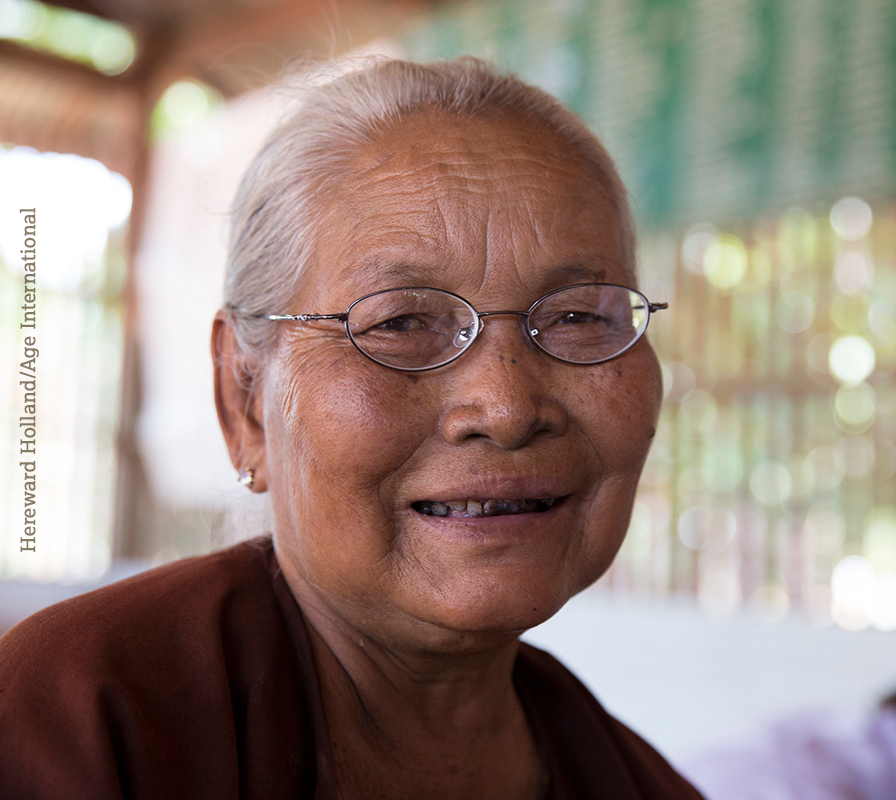This week, HelpAge International is launching the first Disaster Risk and Age Index, ranking 190 countries across the world on the disaster risk faced by older people, at the Third UN World Conference on Disaster Risk Reduction in Sendai.
“The Disaster Risk and Age Index captures the collision of two trends: ageing populations and the acceleration of risk in a world which is increasingly exposed to natural and technological hazards,” said Margareta Wahlström, Special Representative of the UN Secretary-General for Disaster Risk Reduction.
Overall, those in Somalia, Central African Republic and Afghanistan face the highest risk, due in part to ongoing conflict coupled with the lack of service provision for older men and women. While in East Asia and Pacific region, Myanmar is the highest ranked country in the index in 7th position.
Older people are exposed to the lowest risk from disasters in Malta and Finland.
The report has an in-depth focus on the South and East Asia area, as this is the region demonstrating some of the highest disaster and climate change related risks coupled with the fastest ageing populations. For example in Vietnam, Thailand, Cambodia and Myanmar, there will be a 61.4, 58.2, 51.8 and 48.6 percent, respectively, increase in the proportion of older people aged 60+, between 2010 and 2030.
In the Japanese Tsunami of 2011, 56% of those who died were aged 65 and over, despite this age group comprising just 23% of the population. Similarly of those who died in Hurricane Katrina in the US in 2005, 75% were aged 60 or over, but only 16% of the local population were aged 60 or over.
Already, 66% of the world’s over 60s live in less developed regions and by 2050 this is projected to rise to 79%. The world’s population of older people is expected to rise to 2.02 billion by 2050.2
“It is a sign of resilience that there will be this many older people in the world by 2050. But it is the unprecedented rate at which populations are ageing, alongside the increasing frequency of disasters, that presents policy makers with a challenge,” said Toby Porter, Chief Executive for HelpAge International.
“We need to collect data disaggregated by sex, age and disability to demonstrate the impact of disasters on older people. This will help us to develop appropriate strategies in order to save lives,” said Porter.
A study carried out in 2013 by HelpAge International, Disasters and diversity: a study of humanitarian financing, found that only 1% of funded projects in 2012 targeted older people.
When older people are considered in disaster risk reduction efforts, often the responses are inadequate and ill-informed as older people are not engaged or consulted.
“Older people are often seen as passive recipients of aid rather than active participants in disaster risk reduction activities,” said Godfred Paul, Senior Regional Programme Manager for HelpAge International, East Asia Pacific. “They often get overlooked.”
Older people can be real champions for disaster risk reduction at the local level. In 2012, following training on disaster risk reduction, older people in Pakistan noticed the colour of the local river changing and contacted disaster management authorities of the early warning sign. The imminent flooding was confirmed and the community began diverting the water with digging equipment. Because of their actions, 50% less water reached the villages when the flooding occurred.
HelpAge International is urging governments, NGOs and civil society organisations to sign up to Charter 14, a 14 point declaration pledging to include older people in disaster risk reduction efforts.
HelpAge International will present the Disaster Risk and Age Index at the Third World Conference on Disaster Risk in Sendai on the IGNITE stage on 17 March.
You can follow the events of the week with #WCDRR.
Download full press release with the notes to editor in PDF here.
Media contacts:
In Sendai:
Jane Scobie, Director of Advocacy and Communications at HelpAge International
+44 (0) 7713 070 306
jscobie@helpage.org
In London:
Sarah Gillam, Media Relations Manager at HelpAge International
+44 (0) 20 7148 7623, +44 (0) 7713 567 624
sarah.gillam@helpage.org
Beth Howgate, Media Relations Officer at HelpAge International
+44 (0) 20 7148 7606
beth.howgate@helpage.org

